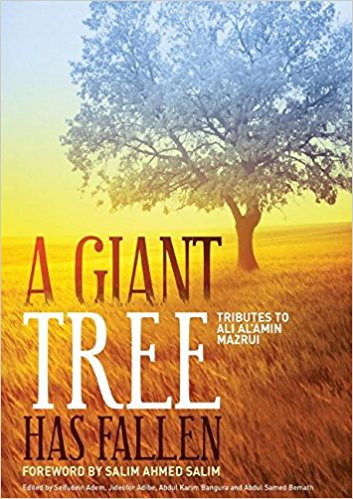
Photo:muse.jhu.edu
‘There could not have been a more fitting tribute to the late Professor Ali Mazrui than A Giant Tree Has Fallen, with a tree being the appropriate symbol for a man born and bred in Africa: resilient, proud, gifted and of formidable intellect.
Here friends and family, academics and politicians offer a glimpse into the life of a man committed to making the world a better place.
There is no denying that this proud African left a mark and brought to the minds of many all over the world the injustice done to vulnerable peoples, especially Africans, by the colonial powers. This compilation is a must-read, especially in these times of debate and discussion on decolonisation and transformation.’
...and it goes without saying that, I am, forever, most grateful and honoured that, I was invited to contribute to this project and book (see below).
A Giant Tree has Fallen: Tributes to Ali Al-Amin Mazui
‘This book memorialising the life and work of Ali Al’amin Mazrui comprises more than 130 tributes written by people ranging from heads of state to journalists. Presented here are those tributes for which copyright permissions were received from among the hundreds that appeared online and print.
In preparing this book, it was made very clear that, unlike other books of tributes to great men and women, there would be no segmentation of the sections based on writers’ and speakers’ positions in life. Instead, it was decided that the tributes be presented in alphabetical order based on writers’ and speakers’ last names.
The decision hinged on the fact that Mazrui would not have opposed any segmentation of people by class, race, ethnicity and gender etc. Nonetheless, out of great respect for Mazrui’s immediate family members, their tributes are presented first, followed by those from his global family members. Also included at the beginning of the book are three chapters that comprise an introductory essay, a brief biography of Mazrui, and an essay on metaphorical-linguistic analysis of the tributes that follow.
The book also has a preface by the co-editors and a forward by Salim Ahmed Salim, the former Prime Minister of the United Republic of Tanzania and Secretary-General of the Organisation of African Unity (OAU), now known as the Africa Union. Dr. Salim, who served as the Secretary-General of the OAU from 1989 to 2001, was Mazrui’s friend and contemporary. Mazrui once described Salim as “Mr Africa” and the “first real postcolonial Secretary-General of the OAU.’
Ali Mazrui (1933-2014): An Intellectual Giant Whom I Met in Kericho, By Kamran Mofid, in A Giant Tree has Fallen, pp. 373-383
Below is a brief introduction to my contributory chapter:
Ali Mazrui (1933-2014): An Intellectual Giant Whom I Met in Kericho --Kamran Mofid

Photo:atlantablackstar.com
Renowned Pan-Africanist, scholar and teacher,Ali Al’amin Mazrui, 81, died peacefully on October 12, 2014 of natural causes at his home in Vestal, New York. I was blessed and honoured to meet Prof. Mazrui at our Fourth Globalization for the Common Good Initiative (GCGI)Annual International Conference, which was held in Nairobi and Kericho in 2005. Prof. Mazrui gave the Keynote Address: ‘Can Africa Tame Globalization? Moral Lessons from Cultural Experience’.
During the Conference I was able to spend some precious moments with him. We were able to talk and debate, both in public and private. I found him endlessly warm, generous, kind and gracious. I value and cherish those moments and memories. I can only say that Africa and the world have lost a great intellect, teacher and ambassador of peace for the common good. I am praying in my own way for Ali Mazrui. May God grant him eternal rest; he was, in the old idiom, a lovely man, who if required may still be a peacemaker in heaven.
‘Africa in the twenty first century is likely to be one of the final battlegrounds of the forces of globalization—for better or for worse. This phenomenon called globalization has its winners and losers. In the initial phases, Africa has been among the losers as it has been increasingly marginalized. There 374 a giant tree has fallen are universities in the United States which have more computers than the computers available in an African country of twenty million people. This has been the great digital divide.
The distinction between the haves and havenots has now coincided with the distinction between digitized and the “digiprived ”. Let us begin with the challenge of a definition. What is globalization? It consists of processes that lead toward global interdependence and the increasing rapidity of exchange across vast distances. The word globalization is itself quite new, but the actual processes toward global interdependence and exchange started centuries ago. Five forces have been major engines of globalization across time: Religion, technology, warfare, economy, and empire. These have not necessarily acted separately, but often have reinforced each other.
For example, the globalization of Christianity started with the conversion of Emperor Constantine I of Rome in 313. The religious conversion of an emperor started the process under which Christianity became the dominant religion not only of Europe but also of many other societies later ruled or settled by Europeans. The globalization of Islam began not with converting a ready-made empire, but with building an empire almost from scratch. The Umayyads and Abbasids put together bits of other people’s empires (e.g., former Byzantine Egypt and former Zoroastrian Persia) and created a whole new civilization. The forces of Christianity and Islam sometimes clashed. In Africa the two religions have competed for the soul of a continent...To read more about the book see: A Giant Tree has Fallen
“Africa and Globalisation for the Common Good: The Quest for Justice and Peace”
Nishkam St. Puran Institute and Guru Nanak Nishkam Sewak Jatha Complex, Kericho, Kenya, April 18-28-2005
